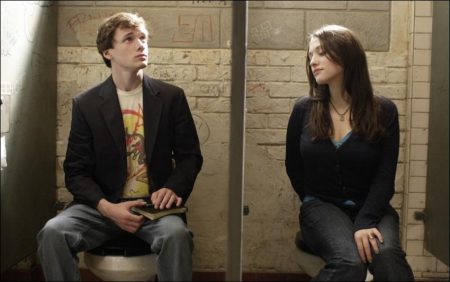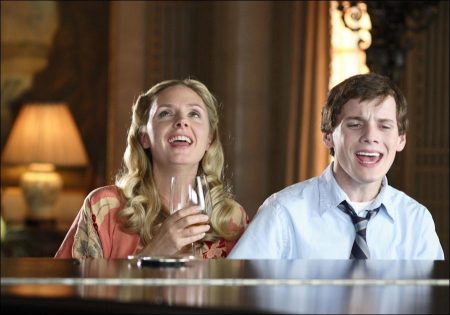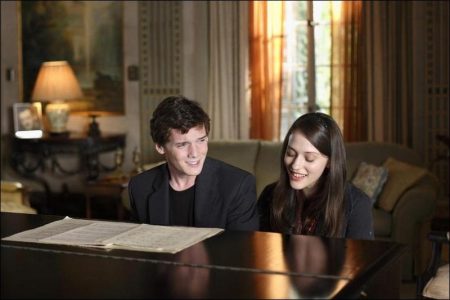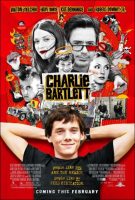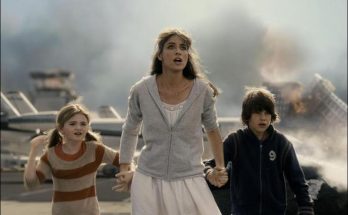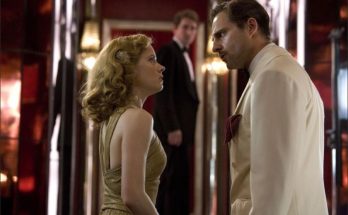Tagline: First come. First cured.
Charlie Bartlett movie storyline. A rich kid (Anton Yelchin) becomes the self-appointed psychiatrist to the student body of his new high school. Charlie Bartlett has been kicked out of every private school he ever attended. And now that he’s moved on to public school, he’s simply getting pummeled. But when Charlie discovers that the kids who surround him–the outcast and the popular alike–are secretly in desperate need, his entrepreneurial spirit takes over.
Hanging up his shingle in the Boys’ restroom, Charlie becomes an underground, not to mention under-aged, shrink who only listens to the private confessions of his schoolmates, and makes the imprudent decision to hand out the pills he’s proffered from his own psychiatric sessions. Meanwhile, at home, Charlie keeps charming his way out of an inevitable confrontation his adoring but utterly overwhelmed mother Marilyn.
Then, Charlie Bartlett makes his big mistake–falling in love with the beautiful and bold daughter of the school’s increasingly disenchanted Principal, who is hot on his trail. As Charlie Bartlett’s world and fledgling psychiatric practice unravel, he begins to discover there’s a whole lot more to making a difference than handing out pills.
About the Production
Among the classic high-school rebels of American movies, there have been truants, delinquents, pranksters and con artists — but there has never been anyone quite like Charlie Bartlett. An optimist, a truth-teller and a fearless schemer, when Charlie slyly positions himself as his new school’s resident “psychiatrist,” dishing out both honest advice and powerful prescriptions, he has no idea the ways in which he will transform his classmates, the school principal and the potential of his own life.
This is the premise of the provocative, Prozac-era comedy, CHARLIE BARTLETT, in which a wealthy teenager’s foray into bathroom-stall psychiatry becomes a smart, funny and touching one-man battle against the loneliness, angst and hypocrisy of the modern world.
Anton Yelchin (“Alpha Dog”) stars as Charlie Bartlett, who has been kicked out of every private school he ever attended. And now that he’s moved on to public school, he’s simply getting pummeled. But when Charlie discovers that the kids who surround him — the outcast and the popular alike — are secretly in desperate need, his entrepreneurial spirit takes over. Hanging up his shingle in the Boys’ restroom, Charlie becomes an underground, not to mention under-aged, shrink who listens to the private confessions of his schoolmates, and makes the imprudent decision to hand out the pills he’s proffered from his own psychiatric sessions. Meanwhile, at home, Charlie keeps charming his way out of an inevitable confrontation with his adoring but utterly overwhelmed mother Marilyn.
Then, Charlie Bartlett makes his big mistake: falling in love with the beautiful and bold daughter (Kat Dennings) of the school’s increasingly disenchanted Principal (Robert Downey, Jr.), who is hot on his trail. As Charlie Bartlett’s world and fledgling psychiatric practice unravel, he begins to discover there’s a whole lot more to making a difference than handing out pills.
CHARLIE BARTLETT marks the directorial debut of Jon Poll — a world-class film editor with deep comic roots who has collaborated with Jay Roach on both the blockbuster “Meet the Parents” and “Austin Powers” series, among others — and the screen debut of writer Gustin Nash. The producers are David Permut, Barron Kidd, Jay Roach and Sidney Kimmel. The executive producers are William Horberg, Jennifer Perini, Trish Hofmann and Bruce Toll. Steve Longi and Gustin Nash co-produced.
Meet Charlie Bartlett
An irreverent teen hero with a wry view of the adult world, an unsinkable belief in the power of youth and an outrageous scheme to ensure his perpetual popularity, CHARLIE BARTLETT quickly drew passionate fans in Hollywood. Among those fans was leading comedy director and producer Jay Roach, who in turn sent the script to his friend Jon Poll, the talented editor who helped create the pace and comedy of Roach’s hit “Meet The Parents” and “Austin Powers” series, and a man now to find a project for his directorial debut.
For Poll, CHARLIE BARTLETT was love at first read. “I’d read a hundred scripts in the last year, just waiting to find one I really liked, and this was it,” recalls Poll. “I laughed out loud as well as felt challenged, entertained, surprised and moved. Here was a high school movie about real people and real issues with lots of humor as well as pathos. Charlie Bartlett was such a great character, someone who could overcome nearly anything with his guileless optimism, and that was really appealing.”
The character of Charlie was born in the imagination of rising young screenwriter Gustin Nash, who was making ends meet by working at a camera store in the Burbank Mall at the time he started writing the screenplay. It was there, among the cliques hanging out at the mall, from the super-cool to the outcast, that Nash first started thinking about the wide disparity between raw truth of the teenagers he saw everyday and the far slicker, simplified kinds of kids he saw depicted at the movies. It was a situation he wanted to rectify.
“That’s when I set out to write something about teenagers that wouldn’t have so much gloss, that would feel pretty authentic,” says Nash. “I mean, teenagers are not stupid and at times I think they’ve got a lot up on adults, so it was important to me that this story feel very real in every aspect.”
Thus it was that Nash began probing how a hopeful kid takes on a world of confusion — a world rife with both high pressure and low self esteem, and with both a huge need for acceptance and an irresistible urge for rebellion. As Nash began writing, CHARLIE BARTLETT began down a provocative path –taking up the issue of pharmaceutical psychiatry and the reality of overmedication of teens with powerful psychotropic drugs, as Charlie begins dispensing Ritalin, Prozac and other “feel-good” pills so popular with adults, among his school’s populace.
Nash knew he was edging into controversial territory with this storyline — but he had no intention of dodging what is a reality for many kids across America who either use or abuse psychiatric drugs. Yet, he also notes that the film is, at heart, a character-driven comedy that is about Charlie’s realization that there’s far more to helping people than just giving them a quick fix. “The film isn’t really pro psychiatric drugs or anti psychiatric drugs,” Nash says. “It’s really about a kid who starts off selling these drugs to gain popularity but comes to realize he can help kids talk about their problems through methods other than drugs. It never occurred to Charlie that he could be doing really good things for people until now.”
Nash especially enjoyed carving out a teen hero with a completely different kind of attitude than is usually seen at the movies. “What makes Charlie cool to me is that some people deal with their turmoil by getting angry or depressed, but Charlie deals with things through optimism,” the writer observes. “He’s always giving other people and new ideas the benefit of the doubt which makes him pretty unusual.”
Though the film dives fearlessly into darker comic territory, Nash ultimately says it is about hope — for both teens and adults. He comments: “I’m sure people will leave this film talking about the drugs, and that’s good, but I what I also really wanted to say with the film is that we’re all going through a lot of these same things and, if you are, you are not alone.”
The script’s mixture of inspirational uplift and edgy hilarity quickly drew in producers David Permut and Barron Kidd. Permut read CHARLIE BARTLETT after Nash submitted the script as a sample of his work in hopes to adapt the acclaimed novel, YOUTH IN REVOLT, which Permut had acquired. After Permut read CHARLIE BARTLETT, he had Nash in his office the next day and not only gave him the YOUTH IN REVOLT assignment, but assured him that they would be making CHARLIE BARTLETT as well. “The script was provocative, original and different,” says Permut. “It’s a comedy that goes beneath the surface and it’s very much about the world we live in today. As a producer, I tend to look for stories that are distinctive, that stand out, that are bold and that’s what I found in Gustin’s script. He also has a real talent for capturing the reality of how kids talk.”
Jay Roach also came on board as a producer, thrilled at the match between CHARLIE BARTLETT and Jon Poll. “Having spent years in cutting rooms with Jon, I can say without hesitation that he’s a pure storyteller and a master of tone,” says Roach. Permut and Kidd were equally excited about what Poll would bring to the production. “Gustin’s story has dark undertones and Jon brought a lot of light and life and humor to the script,” says Kidd.
But when the filmmakers began trying to get the movie off the ground, they ran into resistance. Too dangerous was the most common response. At last, the project found a home at Sidney Kimmel Entertainment, a company which is bringing a fresh and diverse slate of independent projects to the screen. “SKE had the same enthusiastic view of a story that has a lot of relevance for kids today, as well as anyone who knows a kid or ever was one,” says Poll. “I tip my hat to them, because they were very brave and took a chance on an unusual script and a first-time director.”
Says SKE President of production William Horberg of the company’s support of the project: “Charlie Bartlett personifies each of us in that awkward time between adolescence and adulthood. Between the creativity of Gustin’s script and Jon’s vision, we saw the potential for a very humorous and touching homage to the yearning and passion of high school days.”
Being Charlie Bartlett
With CHARLIE BARTLETT now kicking into high gear, the filmmakers began what would be the most vital task of all: finding Charlie. It wouldn’t be an easy bill to fill because Charlie is by no means your standard, stereotypical school rebel or nerd, but a distinctive mix-mastering of buoyant idealism and savvy scheming.
Jon Poll began asking around for recommendations for an actor on the cusp of a breakthrough. Those recommendations led him to Anton Yelchin, the son of two Russian figure skaters who first came to the fore in David Duchovny’s “House of D” and went on to star as Hank Azaria’s son on Showtime’s acclaimed series “Huff” and to play a kidnapping victim in Nick Cassavetes’ “Alpha Dog.”
Although hundreds of hopefuls auditioned for the role, Yelchin essentially sealed the deal in his first meeting with Poll. “He blew me away,” recalls Poll. “I just felt like here’s Charlie Bartlett. He was incredibly empathetic and really funny. And what made me realize he was perfect is that he said it was the honesty and optimism of Charlie that drew him to it. If anyone was ever destined to play a part, I think it was Anton as Charlie Bartlett.”
Right away, Poll and Yelchin started having intense conversations about who Charlie is as the film begins and what he experiences as he becomes the school version of a prescription-peddling Sigmund Freud. After experiencing his own moment of “Ritalin euphoria,” Charlie wants to spread some happiness — which leads to entirely unexpected results. “Like Charlie, Anton’s very smart and he came prepared with a million ideas,” Poll recalls.
One of the ideas Yelchin came in with was that Charlie’s confidence and optimism are borne out of his tough upbringing without a father and with an overwhelmed mother who seems to need more mothering than he does. “I really wanted to show what drives Charlie to be this person who acts in such comical ways,” Yelchin says. “I wanted to show that he has kind of had to parent himself, and that he is someone who responds to his own sadness with humor.”
For Yelchin, the challenge was in constantly straddling the film’s comedy and depth. “The role calls on everything from slapstick to drama,” he notes, “and it left a lot of room for experimentation so I just had a lot of fun with it. It was a thrill being able to come up with so many ideas because that’s what I love to do.”
As for Charlie’s controversial “occupation” as psychiatric drug dealer, Yelchin says: “In all honesty, it’s one of those subjects that people have to deal with and I think this story is a great way to start the conversation.”
Jon Poll’s main advice to Yelchin was to keep taking risks, and he watched in awe as it repeatedly paid off. “Anton started off in such a strong place and his instincts are so right, that I really didn’t have to do much,” Poll says. “There’s not a single scene where Anton didn’t nail it from the start; he delivered huge animated physical comedy and completely captured the subtlest of moments.”
Anton appreciated Poll’s approach: “Jon’s been so generous in giving me the freedom to explore Charlie and try different things with the character; I think I’ve learned a lot about myself through the process.”
Parenting Charlie Bartlett
One of the biggest pleasures of CHARLIE BARTLETT for Anton Yelchin was getting to work with such a stellar cast of co-stars, including Oscar-nominated and Golden Globe winning actor Robert Downey Jr. and Golden Globe nominee Hope Davis as the outrageously dysfunctional and not-very-authoritative authority figures in his midst — each as lost and uncertain as any angst-filled adolescent.
Yelchin was especially thrilled to collaborate with Downey Jr. as Principal Gardner, who becomes Charlie Bartlett’s nemesis in both his social and his love lives since he is also the father of the girl for whom Charlie has fallen head over heels. “Robert’s incredible to watch, just the fluidity of how he expresses himself. I’ve learned so much from him,” says Yelchin.
Jon Poll always saw Principal Gardner as a man who was once a lot like Charlie Bartlett, but was battered into a world-weary cynicism. “I think Gardner can see himself in Charlie and responds to that at the same time that he reacts in another way as a Principal and a father,” says the director.
From the start, Poll considered Robert Downey, Jr. the ultimate actor for the role and was not disappointed. “Robert could not have been a more generous person for me or the other actors to work with,” he says. “He’s amazingly down-to-earth and filled with funny, bright, real ideas. And of course he brings a lot of real life stuff to the part. His character has a lot of issues but it’s refreshing to see Robert come in and do that.”
Downey Jr. loved the script but admits to seeing a certain irony in being cast as the father and authority figure instead of the young rebel. “We all talked about how I would have been Charlie Bartlett 20 years ago,” the actor laughs. “But that’s part of what makes the relationship between Charlie and Gardner so interesting is that they see themselves in each other. You know, every wild guy’s secretly a square and every square is secretly a wild guy.”
Regardless of that recognition, Charlie and Gardner find themselves in an epic student-Principal battle. “I think Gardner really feels he is competing with Charlie for the affection of his daughter. But Charlie’s not the typical, difficult teenager that Gardner’s used to dealing with — he’s a lot smarter and has many more weapons in his arsenal. In the end though, Gardner puts Charlie through his paces by confronting him with a very real, adult crisis. It comes to a very funny and poignant climax.”
Says producer David Permut of their scenes together: “I loved watching Robert go into a rage and Anton not quite sure how to handle that — it made for amazing emotional moments.” That emotional alchemy also impressed screenwriter Gustin Nash. “I remember watching one rehearsal between Anton, Robert and Kat and seeing such incredible chemistry, it felt really good,” he says.
Charlie Bartlett has an equally complex relationship with the other main adult in his life — his extremely wealthy but completely overwhelmed mother, Marilyn, who is given to reading how-to-be-a-better-parent books in the hopes of connecting with her precocious son. Jon Poll always believed Hope Davis would be great for the part and was absolutely thrilled when she accepted the role.
“This is a really tricky, important character and she plays it perfectly,” Poll says. “Hope is someone who, in the matter of just a few lines, can bring a character alive with both humor and pathos. It was also one of those little grace notes of luck that the intimacy between Anton and Hope [who previously starred as mother and son in `Hearts in Atlantis’] was almost immediate and there was a real shorthand of mother and son.”
With children of her own, Davis was instantly drawn in by the film’s compelling subject matter. “I told the writer Gustin that I wish I had seen a film like this when I was 15 because it’s so empowering and it’s so much about being yourself and accepting who you are,” she says.
As for Marilyn, Davis notes that she is “not your average mother.” She continues: “She lives on an estate and enjoys her pills and her cocktails and her music, but I think she’ also very loving. It’s just that she really doesn’t know how to get anything done or how to be really helpful in the real world.” The filmmakers were amazed by the way Davis was able to make Marilyn every bit as comical as she is tragic, and every bit as loved by Charlie as she is bewildered by him. “We knew that Hope would be great,” says Barron Kidd. “She took what could have been a very simple, quirky character and turned it into a very rich portrait.”
Consulting Charlie Bartlett
Surrounding Charlie Bartlett at his new school is a typical teenaged populace who Charlie discovers are suffering from every possible modern adolescent concern: ranging from parents to pressures, popularity, drugs, sex, college, self-esteem and what it’s all about, anyway.
As he develops his bathroom-stall psychiatry business, to Charlie, everyone’s got an interesting and valuable story to tell — but there’s one classmate in particular who he could listen to forever. That’s Susan Gardner, the beautiful, boisterous young woman who unfortunately also happens to be the Principal’s prized, precious daughter. To play Susan, the filmmakers went out in search of a fresh face. After auditioning more than 80 young women for the part, the clear winner was rising young star Kat Dennings, who previously starred in “The 40 Year-Old Virgin,” alongside Steve Carrell and Catherine Keener, another comedy hit which was Executive Produced by Jon Poll.
“I knew Kat was funny, fearless and strong just like the character of Susan,” comments Poll. “Then she blew me away with her audition. We all agreed that she was like a force of nature. I didn’t want Susan Gardner to be your typical beautiful girl in a comedy — she’s beautiful but she’s also very smart and someone to be reckoned with. I’m really proud that we created a female teenage character who operates out of strength.”
Dennings notes that the script was “not like any other movie centered around teenagers that I’d read.” She continues: “It wasn’t some cliché, stereotyped formula that pandered to teenagers and I really liked how the writer made Susan an equal to Charlie. She’s not some dumb girl who sits around looking cute. She’s a real smart cookie.”
It turns out to be Susan’s intelligence more than anything that set Charlie’s heart on fire and earns them both the wrath of Principal Gardner, who is already suspicious of Charlie long before he realizes he’s romancing his daughter. Dennings had a blast working with Robert Downey, Jr. in the role. “Having Robert play my father was just so amazing,” she says. “He’s really smart and cool, and it turned out that we have a lot of funny, obscure stuff in common and we really like talking to each other.”
Dennings continues: “I think Principal Gardner is really a pretty cool dad and he and Susan have a good relationship, but then he starts becoming unhinged. She loves him a lot but she’s not sure how much she respects him right now. It was very interesting to me the way that both Charlie and Susan are in this position where they’re acting more mature than the adults in their lives, even though they also really need those adults.”
As for why Susan falls for Charlie, Dennings says: “The thing about Charlie is that he definitely has flaws, but at the bottom of it all, he’s also really good-hearted. It’s rare to find somebody like that who’s so honest and true to himself and has no real undertone. I think a lot of people will fall in love with him.”
Also joining the cast is musician/actor Tyler Hilton, who made an auspicious debut in the award-winning “Walk the Line” as a young Elvis Presley. Here, he plays the seemingly sinister school bully Murphy, who ultimately becomes Charlie’s unlikely business partner. The filmmakers knew that for Murphy, they needed an actor with a cool, menacing quality — but also someone who could be believable in finding middle ground with the far nerdier Charlie Bartlett. It was Hilton’s audition that convinced the filmmakers he could ride that line. “He shaved his head into a Mohawk, came in and just nailed it,” recalls Jon Poll. “Not a lot of actors are good at being truly bad. But Tyler wasn’t afraid to go all the way. Tyler’s one of the sweetest guys around but he didn’t sweeten the character a drop.”
Hilton was knocked out by the script. “I was like, man, this is a really good movie about high school with a completely different twist and awesome characters,” he says. But, at first, Hilton was afraid no one would consider him for the part of an unrepentant bad boy. “It was the coolest script with the coolest character, and I thought I’m never going to get it,” admits Hilton. “But at the last minute, they decided to take a chance.”
As for why Murphy ultimately takes a chance on getting to know Charlie Bartlett, Hilton explains: “I think all the kids are like, I can’t believe this guy, he’s crazier than all of us. And there’s a respect that comes with that. Murphy kicks Charlie’s ass, but he just keeps coming back, wanting to be friends.”
Hilton also believes that Charlie is secretly what Murphy has needed in his life. “I think Murphy is someone who is actually very alone and who feels so pressed down that there’s nowhere to go except to be angry,” he says. “But Charlie says things to him that nobody else would ever say. He’s so persistent and brave, that you almost can’t not be friends with him. And Murphy needs a true friend.”
Rounding out the student body cast is an ensemble of young Canadian actors including Mark Rendall in a heart-rending performance as the unpopular Kip Cromwell, Megan Park as the secretly sad cheerleader Whitney Drummond, Dylan Taylor as Len, Jonathan Malen as Jordan and Jake Epstein as Dustin.
In working with so many exciting and talented young actors, Poll afforded them the same kind of respect the screenplay does — he simply gave as much freedom as possible, asking them to make their characters real. The proof of his method came in the results.
“There wasn’t a moment that this cast didn’t come in and give the movie more than I could have ever imagined,” Poll sums up.
Charlie Bartlett’s World
With such strong characters to work with in CHARLIE BARTLETT, director Jon Poll always knew he would need an equally strong, contemporary visual style to bring Charlie’s worlds at home and school to vibrant life. He began with storyboards that expressed a realistic but dynamic view of 21st Century teen life. He then collaborated closely with cinematographer Paul Sarossy, production designer Tamara Deverell and costume designer Luis Sequeira to turn his ideas into reality on the screen.
Poll considered more than 80 cinematographers before settling on Sarossy, who has won awards for his work on such films as the chilling thriller “The Wicker Man” and Atom Egoyan’s elegiac drama “The Sweet Hereafter.” Poll says that Sarossy “made the pictures that were in my head even more real and interesting.” In keeping with Poll’s storyboards, Sarossy developed unique looks for each Charlie Bartlett’s diverse environments, keeping the camera very static with clean, formal angles whenever he’s on his mother’s estate, but then descending into a grittier, far more kinetic feeling with hand-held cameras and stark lighting when Charlie’s at school.
Comments Poll: “Paul was able to create an extraordinarily visual movie with a very strong sense of place and style. It was a pleasure and a joy to work with him — and the movie looks beautiful.”
Meanwhile, production designer Tamara Deverell, who most recently designed the family feature “Firehouse Dog,” tackled a wide range of locales for the film, ranging from Charlie’s luxurious and formal home to the funky Student Lounge that was built — and then destroyed — for the production. “Tamara had this ability to create sets that looked like they had always been there, even if she just built them a few days before, and always felt incredibly real,” Poll says.
Costume designer Luis Sequeira, who recently designed the costumes for the acclaimed thriller “Breach,” made it his mandate to nail the appropriate uniform of every clique, gang and team at a modern high school. “Luis made everyone look like so true-to-life,” notes Poll, “and that added to the whole atmosphere.”
Adds actress Megan Park, who plays Whitney Drummond, of the film’s design: “The whole thing just screamed of my own high school experience.”
Throughout, the producers give Jon Poll credit for inspiring everyone on the set, from cast to crew. Producer David Permut believes that Poll’s extensive editing background gave him a unique advantage on the set, where he was always looking at the “big picture.” “As a world-class editor, Jon’s mind is constantly turning and he always thinking in terms of options and all the different ways of going,” Permut explains. “In every aspect of the film, he’s really captured the spirit and the tone of CHARLIE BARTLETT.
For Poll, that spirit is inspired most of all by Charlie himself — a character who breaks barriers by being at once funny and serious, lovable and provocative, amusing and revealing. Sums up Poll: “I really hope that audiences laugh at Charlie’s outrageousness and then are surprised at how much they’re moved.”
Charlie Bartlett (2008)
Directed by: Jon Poll
Starring: Anton Yelchin, Robert Downey Jr., Hope Davis, Tyler Hilton, Jake Epstein, Lauren Collins, Dylan Taylor, Mark Rendall, Kat Dennings, Derek McGrath
Screenplay by: Gustin Nash
Production Design by: Tamara Deverell
Cinematography by: Paul Sarossy
Film Editing by: Alan Baumgarten
Costume Design by: Luis Sequeira
Set Decoration by: Zeljka Alosinac
Art Direction by: Joshu de Cartier
Music by: Christophe Beck
MPAA Rating: R for language, drug content and brief nudity.
Distributed by: Metro Goldwyn Mayer
Release Date: February 1, 2008
Views: 101
